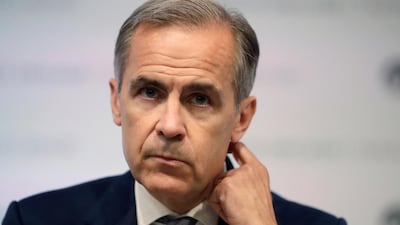For a staunch supporter of central bank “forward guidance”, Mark Carney changes his mind a tad too often.
From when he will leave his job running the Bank of England, to when the BOE’s Monetary Policy Committee will next raise interest rates, there are plenty of examples.
Yet on one crucial subject for the British economy, Mr Carney has been uncharacteristically consistent: don’t rely on the Bank coming to the rescue by cutting rates in the event of a messy Brexit.
The governor has said more than once that, should Britain crash out of the EU without a deal, the central bank response wouldn’t be obvious. It was easy to imagine a scenario where “policy would have to be tighter, not looser”, he told UK policymakers on Tuesday.
This might surprise some. After all, didn’t he cut interest rates and buy more government bonds after Brits voted to quit the EU in June 2016? Why act differently after a “no-deal” exit?
The difference is that a disorderly departure would be much worse for the economy than the referendum result. The Brexit vote still left open the possibility of a “soft” Brexit, whereby Britain would keep a relatively frictionless arrangement with its biggest trading partner. Yet should the country crash out of the the bloc and fall back on World Trade Organisation rules, it would be a nightmare for companies and investors.
Sterling hasn’t recovered from its post-referendum tumble, but no deal would inevitably push it much lower. And this wouldn’t be investors betting on various possible scenarios – as has been the case since 2016. The probable queues of lorries at Dover; the difficulties for finance firms accessing the EU market; the creation of a hard border with Ireland – these have the potential to cause a currency crisis not unlike those occurring in emerging markets such as Argentina.
What would the Bank of England do under these circumstances? The post-referendum playbook may, indeed, be the wrong one. In 2016, the Bank judged that sterling would fall but stabilise relatively quickly. This would make imported goods more expensive, it reasoned, but any impact on inflation would be short-lived. The risk of an inflationary spiral was therefore small. The Bank could easily ignore a deviation from its 2 per cent inflation target, and focus on supporting the economy.
_______________
Read more:
EU chief negotiator Barnier's Brexit comments roil the pound
Fitch says disastrous 'no-deal' Brexit a growing possibility
_______________
But in the event of a full-blown currency crisis, the economics textbook says a central bank must deal with that first of all. It’s precisely what Argentina has tried to do by raising interest rates to 60 per cent, and what Turkey is being much slower in doing. The BOE would need to prioritise keeping inflation in check over supporting a recovery. So it would have to raise interest rates, even at the cost of causing (or worsening) a recession.
Even if the pound found some support, the Bank would have plenty of reasons to lift rates. A no-deal Brexit would make the UK less productive, since it would increase supply constraints on companies. “If some of the supply side were to be chewed up, then even a fall in demand would not necessarily raise the output gap and therefore put a downward pressure on inflation,” Andrew Haldane, the BOE’s chief economist, told policymakers.
Of course, Britain is neither Argentina nor Turkey. Its institutions and economy are far stronger, which will help maintain a degree of faith in its currency. It’s possible therefore that the inflation outlook might be kept under control, allowing the Bank to prioritise a recovery.
However, this would be by no means certain. Mr Carney is right to keep his options open – if indeed he is planning to stick around until 2020, as the Financial Times has reported. It will also help to remove any excuses from politicians. If a disorderly departure causes a recession, the Bank might be too busy fighting inflation to help the government out.

